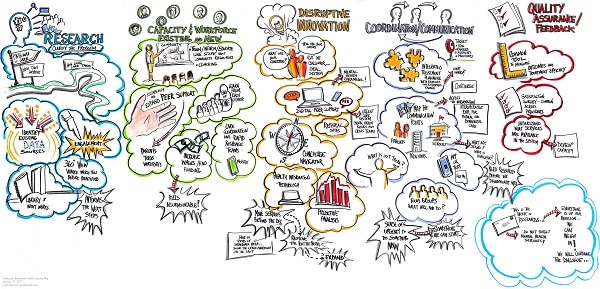
Pittsburgh creates community action plan for teen mental health
Above image: This real-time visual representation of the city-wide assembly on adolescent behavioral health was created by graphic illustrator Leah Silverman.
Of all the thorny problems faced by teenagers and their still-developing brains, mental illness and substance abuse can be the hardest to address. Families experience long wait times for care, followed by little follow-up. A shortage of healthcare practitioners, limited facility capacity and the number of in-patient beds add to the issue. Communication between multiple insurance plans and hospital systems frequently breaks down, further slowing care.
To address these complicated issues and create a community action plan, the Jewish Healthcare Foundation (JHF) recently convened a city-wide assembly. Included were more than 50 behavioral health providers, non-profit leaders, foundations, family and patient advocates and elected officials.
The result is the Adolescent Behavioral Health Initiative (ABHI).
“Since we started in 2016, we’ve been talking with community partners about what we can do,” says Robert Ferguson, Jewish Healthcare Foundation’s director of government grants and policy. “The action we’re planning on taking now is working with communities to develop a pilot or demo to expand crisis services in the community to help reduce the time from onset to stabilization, and ultimately, recovery.”
Pittsburgh is not unique in its youth mental health issues.
“It’s pretty common set of problems everywhere,” Ferguson says. “Across the country, people are experiencing … a lack of effective resources to identify and address behavioral health needs.”
As a positive step, he points to the federal “21st Century Cures Act,” which includes mental health policies. The law passed at the end of the Obama administration with a lot of bipartisan support, he says.
The cost of care is less of a problem than one might expect, at least for now, in part because of the Affordable Care Act. “People’s health insurance now covers behavioral health,” Ferguson says. “There’s a lot of Medicaid and CHiP coverage as well.
It’s still early, but Ferguson believes Pittsburgh’s plan for adolescent mental health is on the right path. The pilot ABHI program will begin by summer 2017.
Here are some resources for families in crisis:
- Crisis Network in Allegheny County
- Allegheny County Department of Human Services, Office of Behavioral Health
- Substance Abuse and Mental Health Services Administration: Online locator with maps to facilities nationwide
- PA United Way’s 211, includes a list of mental health services.